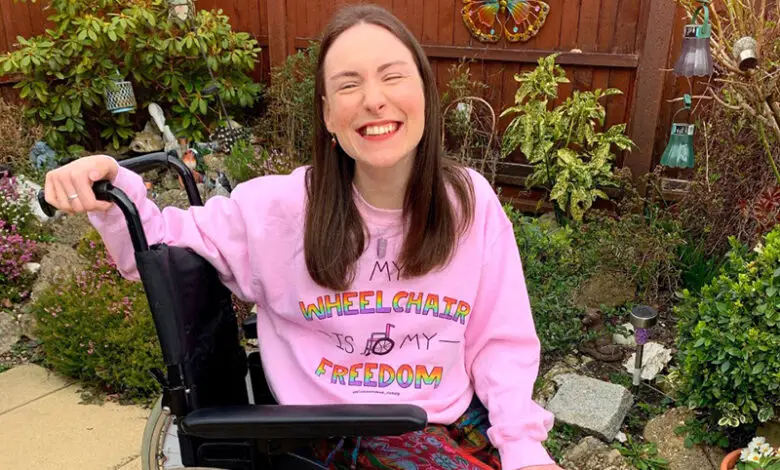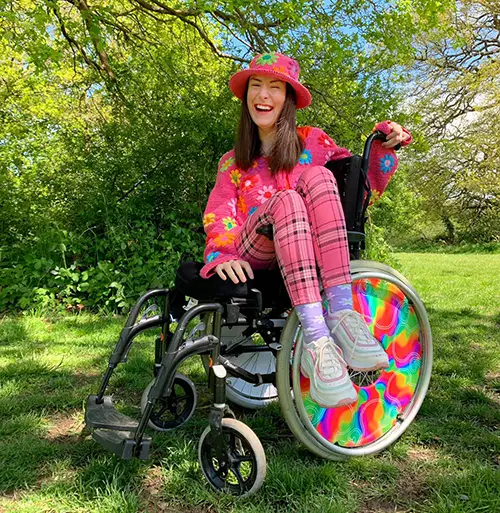
8 misconceptions about disabled women busted
There are many assumptions and misconceptions about disabled women in our society. Some people think that they are unable to be parents, can’t embrace their femininity or have meaningful relationships, and are fragile.
In this article, wheelchair user Rebecca Sullivan aims to break down the preconceptions about disabled women, demonstrating that disabled women can live just as fulfilling lives as non-disabled women.
Being a disabled woman can bring a whole host of misconceptions about what it means. Disabled women may have to do things differently, but this does not and should not prevent us from embracing all aspects of womanhood if that is what we desire.
Below are eight misconceptions about disabled women that stand out for me, either from what I have heard and seen or from my own experience.
1. Disabled women can’t date or have relationships
It is sometimes assumed that disabled women are unable to date, that we are incapable of having relationships and aren’t sexual beings. This simply isn’t true.
Dating is an opportunity to get to know someone, to find out whether they are a kindred spirit, and to potentially meet the love of your life. Being disabled doesn’t stop a person from experiencing this.
Disabled women date, have relationships and, yes, sex too! But despite this, some people can’t get their heads around it.
People often wrongly assume a disabled woman’s partner is their carer, and that they can’t possibly have a romantically fulfilling relationship.
This stigma overshadows a fundamental need we all have to develop deep connections with others, and hinders our chances of exploring this side of life.
2. Disabled women can’t have a family
Disabled women are seen as being dependent on others and, therefore, not able to care for a child or be in a motherly role.
There is no rule book as to how a family should look. Parenting comes in all shapes and sizes, and as long as the child is happy and loved, it doesn’t matter how exactly they are cared for. No parent or family should not be judged for what their life looks like.
3. Disabled women shouldn’t embrace their femininity
It is a rarity that disabled women are seen or talked about as ‘sexy’ or ‘hot,’ unlike how many non-disabled women are considered all of the time. It is as if disabled women are meant to live by different rules or are seen as some other species.


I know of women who are wheelchair users who have been reprimanded and shamed for wearing short skirts and revealing necklines. Many disabled women have the desire to be perceived, wholly, as a woman, just like anyone else, and this desire should be met.
One way women can embrace their femininity and identity is through lingerie. But they’re often inaccessible as we aren’t considered when designing such items.
Lingerie, along with all other clothing, should be made accessible so that we can dress exactly how we wish, not how society thinks we should.
4. Disabled women can’t be independent
It is often thought that disabled women always need help and that things always need to be done for us. I frequently have had people try to help me without even asking whether I need it.
When I have declined assistance, people have rolled their eyes, called me stubborn or simply got frustrated.
Because I have cerebral palsy, my way of doing something may look like I’m struggling. But by saying ‘no’, I am saying “I have got this. I am capable.” I, like many other disabled women, can be independent – we just do things in a different way.
5. Disabled women are considered fragile
Disabled women can be seen as fragile so are often treated in this way. Like with the above, people may assume that disabled women always need help or that we are unable to do certain things.
But the truth is, disabled women are strong and resilient, in many cases more so than non-disabled women because of the barriers we face. The idea of fragility needs to be removed so that we can be seen in our own right as people.
6. Women’s rights aren’t as important for disabled women
Two incredibly important topics that need to be addressed and improved are disability rights and women’s rights. But for disabled women, disability rights are often thought to be more important than women’s rights.


Disabled women need to be a part of conversations around women’s rights just as much as other women. We still face the same challenges, stigmas and inequality, but this is played down because people see the disability first. Every woman needs to be advocated for – disabled or not.
7. Disabled women have separate interests from non-disabled women
People often assume that the things non-disabled women take pride in are not as important for disabled women.
Fashion is the perfect example. For many disabled women, a lot of fashion items are inaccessible. But that doesn’t mean we have a lack of interest in them.
I can’t wear a variety of shoes because the heal is too high or there is a lack of foot support, but I still pine for the shoes of my dreams.
Like with lingerie, if more clothes were made with accessibility in mind, we could wear a wider range of fashionable items that we crave.
Beauty places and hairdressers are often inaccessible too. This is firstly in terms of the physical spaces, for example, because the chairs are unstable or washbasins are too high.
But this also applies to the way in which disabled women are spoken to, or more so to the person we are with. It can feel as if we shouldn’t be there, that we don’t belong.
8. Disabled women can’t have certain disabilities
There are certain disabilities that are perceived as ones that disabled women can’t have. This means these disabilities get undiagnosed, leaving some disabled women unsupported.
For example, autism is diagnosed more in men than women. Makeup artist Sophie Baverstock, who recently won the BBC makeup competition Glow Up, battled to get her autism recognised.
The National Autistic Society says that a possible reason for this is because women “are often better at masking or camouflaging their difficulties.” However, it also says that diagnosing the disability in females is getting better.
By Rebecca Sullivan
More on Disability Horizons…